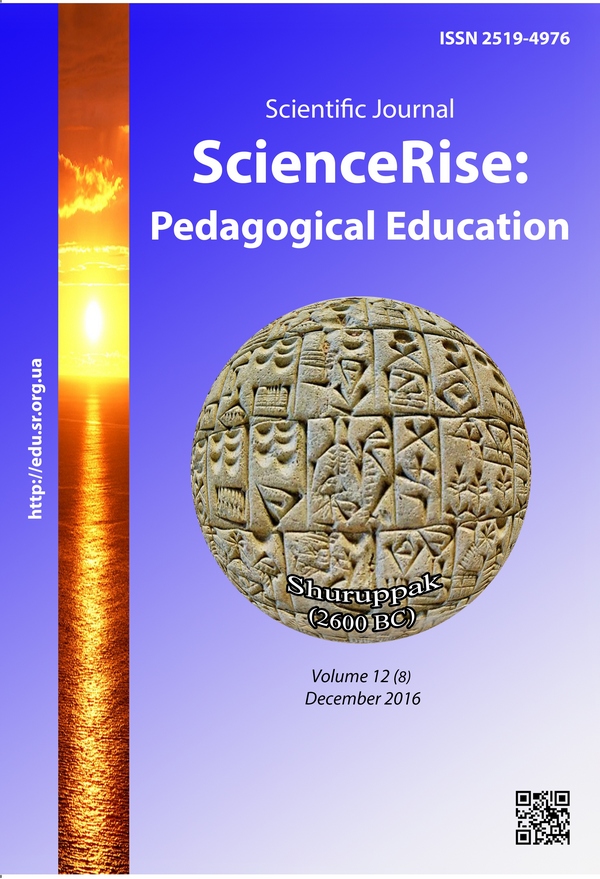The development of the ways of formation of the readiness of future higher school teachers for professional self-improvement in the process of extracurricular work
DOI:
https://doi.org/10.15587/2519-4984.2016.87728Keywords:
MA student, future teacher, master-class, pedagogical skill, self-improvement, extracurricular workAbstract
The role and possibilities of extracurricular work in the process of formation of the readiness of future higher school teachers to professional self-improvement are elucidated in the article. The new scientific views on personal self-improvement are considered. It is noted, that professional self-improvement of the future teacher is the purposeful process of improvement of the level of own professional competence, comprehended by MA student and directed on maximal realization of he/her-self as a teacher according to personal program of self-improvement. The ways and features of professional self-improvement of future higher school teachers are demonstrated.
The following forms of extracurricular work as the one of the ways of formation of readiness of future higher school teachers to professional self-improvement are indicated: scientific, creative-cognitive, professionally oriented one. The most effective ways as to preparation of future teachers to professional self-improvement are defined: participation in scientific clubs of professional direction, scientific researches within scientific topic of department, preparation of articles and theses of reports of scientific conferences, participation in trainings, master-classes of professional growth, meetings of clubs of pedagogical innovations, pedagogical-creative meetings, teaching-discussing platforms of pedagogical experience.
It is stressed, that the complex organization of all types of extracurricular work of future teachers allows improve the level of creative activity of MA students that ensures their further professional and personal growth and self-improvement during the whole life
References
- Ihnatiuk, O. A. (2010). Teoretychni ta metodychni osnovy pidhotovky maibutnoho inzhenera do profesiinoho samovdoskonalennia v umovakh tekhnichnoho universytetu. Kharkiv, 43.
- Kremen, V. G. (Ed.) (2008). Entsyklopediia osvity. Kyiv: Jurіnkom іnter, 1040.
- Sivers, Z. F., Gaevs'ka, L., Mironenko, V., Saevich, І., Nalivajko, S., Saenko S. et. al. (2008). Fenomen tvorchosti yak bazova skladova akmeolohichnoho rozvytku osobystosti. Osvita i upravlinnia, 1, 47–55.
- Slobodchikov, V. I., Isaev, E. I. (1995). Psikhologiya cheloveka. Moscow: Shkola-Press, 332.
- Sushchenko, T. I. (2012). Mahisterskyi pedahohichnyi protses pidhotovky vykladachiv VNZ yak zrazok maibutnoi profesiinoi diialnosti. Pedahohika formuvannia tvorchoi osobystosti u vyshchii i zahalnoosvitnii shkolakh, 24, 457–464.
- Zjazjun, І. A. (Ed.) (2008). Pedahohichna maisternist. Kyiv: Vishha shkola, 462.
- Klimov, Ye. A. (1996). Psikhologiya professionalnogo samoopredeleniya. Rostov-na-Donu: Feniks, 512.
- Markova, A. K. (1996). Psikhologiya professionalizma. Moscow: Mezhdunarodnyj gumanitarnyj fond «Znanie», 308.
- Shavir, P. A. (1981). Psikhologiya professionalnogo samoopredeleniya v ranney yunosti. Moscow: Pedagogika, 96.
- Donchenko, M. V. (2004). Profesiino-pedahohichna pidhotovka maibutnikh uchyteliv u pozaaudytornii roboti u VNZ Ukrainy (II polovyna ХХ st.). Kharkiv, 180.
- Lobkovits, N. (1998). Chto takoe lichnost. Voprosy filosofii, 2, 54–65.
- Onuchak, L. V. (2002). Pedahohichni umovy orhanizatsii samostiinoi pozaaudytornoi roboty studentiv ekonomichnykh spetsialnostei. Kyiv, 200.
- Honcharenko, S. U. (1997). Ukrainskyi pedahohichnyi slovnyk. Kyiv, 375.
Downloads
Published
How to Cite
Issue
Section
License
Copyright (c) 2016 Володимир Миколайович Кравченко

This work is licensed under a Creative Commons Attribution 4.0 International License.
Our journal abides by the Creative Commons CC BY copyright rights and permissions for open access journals.
Authors, who are published in this journal, agree to the following conditions:
1. The authors reserve the right to authorship of the work and pass the first publication right of this work to the journal under the terms of a Creative Commons CC BY, which allows others to freely distribute the published research with the obligatory reference to the authors of the original work and the first publication of the work in this journal.
2. The authors have the right to conclude separate supplement agreements that relate to non-exclusive work distribution in the form in which it has been published by the journal (for example, to upload the work to the online storage of the journal or publish it as part of a monograph), provided that the reference to the first publication of the work in this journal is included.








